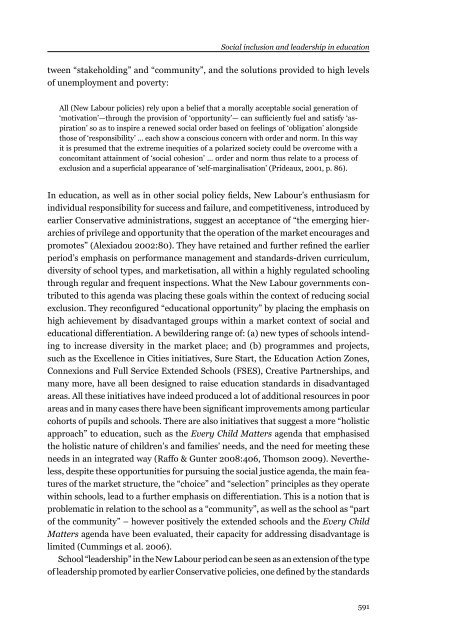Social inclusion and leadership in education: An evolution of roles ...
Social inclusion and leadership in education: An evolution of roles ...
Social inclusion and leadership in education: An evolution of roles ...
- No tags were found...
You also want an ePaper? Increase the reach of your titles
YUMPU automatically turns print PDFs into web optimized ePapers that Google loves.
<strong>Social</strong> <strong><strong>in</strong>clusion</strong> <strong>and</strong> <strong>leadership</strong> <strong>in</strong> <strong>education</strong>tween “stakehold<strong>in</strong>g” <strong>and</strong> “community”, <strong>and</strong> the solutions provided to high levels<strong>of</strong> unemployment <strong>and</strong> poverty:All (New Labour policies) rely upon a belief that a morally acceptable social generation <strong>of</strong>‘motivation’—through the provision <strong>of</strong> ‘opportunity’— can sufficiently fuel <strong>and</strong> satisfy ‘aspiration’so as to <strong>in</strong>spire a renewed social order based on feel<strong>in</strong>gs <strong>of</strong> ‘obligation’ alongsidethose <strong>of</strong> ‘responsibility’ … each show a conscious concern with order <strong>and</strong> norm. In this wayit is presumed that the extreme <strong>in</strong>equities <strong>of</strong> a polarized society could be overcome with aconcomitant atta<strong>in</strong>ment <strong>of</strong> ‘social cohesion’ … order <strong>and</strong> norm thus relate to a process <strong>of</strong>exclusion <strong>and</strong> a superficial appearance <strong>of</strong> ‘self-marg<strong>in</strong>alisation’ (Prideaux, 2001, p. 86).In <strong>education</strong>, as well as <strong>in</strong> other social policy fields, New Labour’s enthusiasm for<strong>in</strong>dividual responsibility for success <strong>and</strong> failure, <strong>and</strong> competitiveness, <strong>in</strong>troduced byearlier Conservative adm<strong>in</strong>istrations, suggest an acceptance <strong>of</strong> “the emerg<strong>in</strong>g hierarchies<strong>of</strong> privilege <strong>and</strong> opportunity that the operation <strong>of</strong> the market encourages <strong>and</strong>promotes” (Alexiadou 2002:80). They have reta<strong>in</strong>ed <strong>and</strong> further ref<strong>in</strong>ed the earlierperiod’s emphasis on performance management <strong>and</strong> st<strong>and</strong>ards-driven curriculum,diversity <strong>of</strong> school types, <strong>and</strong> marketisation, all with<strong>in</strong> a highly regulated school<strong>in</strong>gthrough regular <strong>and</strong> frequent <strong>in</strong>spections. What the New Labour governments contributedto this agenda was plac<strong>in</strong>g these goals with<strong>in</strong> the context <strong>of</strong> reduc<strong>in</strong>g socialexclusion. They reconfigured “<strong>education</strong>al opportunity” by plac<strong>in</strong>g the emphasis onhigh achievement by disadvantaged groups with<strong>in</strong> a market context <strong>of</strong> social <strong>and</strong><strong>education</strong>al differentiation. A bewilder<strong>in</strong>g range <strong>of</strong>: (a) new types <strong>of</strong> schools <strong>in</strong>tend<strong>in</strong>gto <strong>in</strong>crease diversity <strong>in</strong> the market place; <strong>and</strong> (b) programmes <strong>and</strong> projects,such as the Excellence <strong>in</strong> Cities <strong>in</strong>itiatives, Sure Start, the Education Action Zones,Connexions <strong>and</strong> Full Service Extended Schools (FSES), Creative Partnerships, <strong>and</strong>many more, have all been designed to raise <strong>education</strong> st<strong>and</strong>ards <strong>in</strong> disadvantagedareas. All these <strong>in</strong>itiatives have <strong>in</strong>deed produced a lot <strong>of</strong> additional resources <strong>in</strong> poorareas <strong>and</strong> <strong>in</strong> many cases there have been significant improvements among particularcohorts <strong>of</strong> pupils <strong>and</strong> schools. There are also <strong>in</strong>itiatives that suggest a more “holisticapproach” to <strong>education</strong>, such as the Every Child Matters agenda that emphasisedthe holistic nature <strong>of</strong> children’s <strong>and</strong> families’ needs, <strong>and</strong> the need for meet<strong>in</strong>g theseneeds <strong>in</strong> an <strong>in</strong>tegrated way (Raffo & Gunter 2008:406, Thomson 2009). Nevertheless,despite these opportunities for pursu<strong>in</strong>g the social justice agenda, the ma<strong>in</strong> features<strong>of</strong> the market structure, the “choice” <strong>and</strong> “selection” pr<strong>in</strong>ciples as they operatewith<strong>in</strong> schools, lead to a further emphasis on differentiation. This is a notion that isproblematic <strong>in</strong> relation to the school as a “community”, as well as the school as “part<strong>of</strong> the community” – however positively the extended schools <strong>and</strong> the Every ChildMatters agenda have been evaluated, their capacity for address<strong>in</strong>g disadvantage islimited (Cumm<strong>in</strong>gs et al. 2006).School “<strong>leadership</strong>” <strong>in</strong> the New Labour period can be seen as an extension <strong>of</strong> the type<strong>of</strong> <strong>leadership</strong> promoted by earlier Conservative policies, one def<strong>in</strong>ed by the st<strong>and</strong>ards591

















